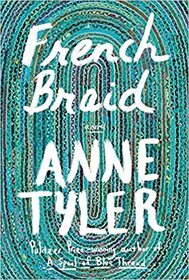Helpful Score: 2
Vague Family Love
The Butterfly Effect suggests the slightest, most inconspicuous event can change the course of history.
Anne Tyler's "French Braid" covers generations of the Garrett family from Baltimore. The family consists of wonderfully realized characters, but there always seems to be a fog between them... they are never quite able to completely bond with one another. We see this at the onset as we find them on vacation at a lake and it is noted that passersby could not even detect that the family members knew each other.
My two favorite characters are the mother and father, Mercy and Robin. Robin loves Mercy with every bit of his heart-- and is pretty clueless as to what makes her tick. "He never asked her why (she loves him); he was deeply afraid that if she reflected too deeply, she would realize her mistake." Mercy has been drifting away from him for years; no, nothing as calamitous as a divorce or public separation. She finds a nearby office / apartment / studio to do the painting she's longed to explore her whole life. She gradually spends more and more time there, using her work as a cover to spend nights apart. Meanwhile, Robin exists in absolute denial that anything has changed.
There is also David, the son everybody loves and can not understand why he distances himself from the family. Despite all the family dysfunction, David eventually realizes "that's how families work, too. You think you're free of them, but you're never really free; the ripples are crimped in forever." If you try looking for some big bang, some Hitchcockian MacGuffin to show how the relationships have landed where they have-- well, we will not find that in Anne Tyler's world. We discover the smallest pushes have nudged family dynamics here to this point.
We live in the age of sound-bites, of edited action scenes, of instant gratification. Every 007 movie opens with that splashy "grab their attention" sequence. It is nice to step back, breathe out slowly, and allow Anne Tyler to put her real-life compositions on exhibit.
I received an advance review copy for free, and I am leaving this review voluntarily.
The Butterfly Effect suggests the slightest, most inconspicuous event can change the course of history.
Anne Tyler's "French Braid" covers generations of the Garrett family from Baltimore. The family consists of wonderfully realized characters, but there always seems to be a fog between them... they are never quite able to completely bond with one another. We see this at the onset as we find them on vacation at a lake and it is noted that passersby could not even detect that the family members knew each other.
My two favorite characters are the mother and father, Mercy and Robin. Robin loves Mercy with every bit of his heart-- and is pretty clueless as to what makes her tick. "He never asked her why (she loves him); he was deeply afraid that if she reflected too deeply, she would realize her mistake." Mercy has been drifting away from him for years; no, nothing as calamitous as a divorce or public separation. She finds a nearby office / apartment / studio to do the painting she's longed to explore her whole life. She gradually spends more and more time there, using her work as a cover to spend nights apart. Meanwhile, Robin exists in absolute denial that anything has changed.
There is also David, the son everybody loves and can not understand why he distances himself from the family. Despite all the family dysfunction, David eventually realizes "that's how families work, too. You think you're free of them, but you're never really free; the ripples are crimped in forever." If you try looking for some big bang, some Hitchcockian MacGuffin to show how the relationships have landed where they have-- well, we will not find that in Anne Tyler's world. We discover the smallest pushes have nudged family dynamics here to this point.
We live in the age of sound-bites, of edited action scenes, of instant gratification. Every 007 movie opens with that splashy "grab their attention" sequence. It is nice to step back, breathe out slowly, and allow Anne Tyler to put her real-life compositions on exhibit.
I received an advance review copy for free, and I am leaving this review voluntarily.




